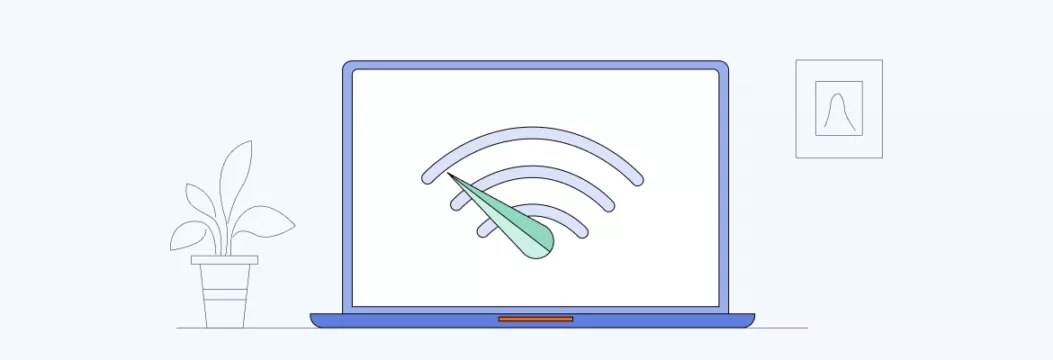Am I Being Throttled? How Do You Stop This Right Now?
Think about when you are sitting on the Internet, watching the Netflix series, or playing an online game. Then inexplicably, your internet pores. Your internet is slow or to be more specific, your connection speed has been slackened. You may be thinking that it is your router, or maybe your neighbors are stealing your bandwidth. There might be, but the other general cause of such poor speed of the internet is internet throttling. Throttling is also annoying as some users are not even aware of this act. Continue further to learn ways of determining whether you are being throttled by your ISP and what action you can take to stop it.
ISPs can throttle any site or service they want, including live streaming, gaming, high-def video, downloading, and torrenting – basically, anything that’s data-intensive.

What is Internet throttling?
Internet throttling, also known as data throttling or bandwidth throttling, is when your ISP slows down your connection speeds and limits your bandwidth (the maximum rate of data that your network can transmit). ISPs usually use internet throttling against traffic-heavy online activities like media streaming, online gaming, video streaming, file transfers, and downloading heavy files.
ISPs throttle by deliberately slowing down specific types of online activity, such as streaming or file transfers, to manage network congestion.
But why do they do it, you ask? ISPs throttle to manage network traffic, enforce data caps, or save costs. Here’s a rundown of the most common reasons why ISPs might intentionally slow down your internet speed.
Why ISPs slow down your Internet speed
- To Cut Expenses. It’s pretty straightforward – if you consume a lot of data, your ISP ends up footing the bill. The primary interest of internet providers is to grow the number of customers and reduce the amount of bandwidth they use. ISPs might throttle your connection to save money by limiting bandwidth usage.
- To Limit Data Usage at Peak Hours. This is also known as network congestion. When network nodes get slammed with a lot of data, they become overloaded. So ISPs sometimes limit data usage to prevent this from happening. That’s why internet throttling is more common during the day than at night. Cable internet users are especially likely to experience throttling during peak hours due to bandwidth sharing and network congestion.
- To Get You to Upgrade Your Plan. If your internet connection is too slow, you might be tempted to upgrade your plan. Your ISP might use this opportunity to artificially slow down your connection and encourage you to pay more for faster speeds or a higher data cap.
- To Prevent the Use of Certain Online Services. Another sneaky reason for internet throttling is paid prioritization. For instance, your ISP might have an agreement with a particular streaming service to prioritize it over competitors. So they might intentionally limit your connection speed when you’re watching content on other platforms and boost it when you’re using the prioritized one.
Most ISPs throttle connections to manage network traffic, although the frequency varies.
As you can see, many reasons for internet throttling don’t exactly seem legit. But does that make them illegal?
Is Internet throttling illegal?
In different countries, laws on internet throttling differ. To illustrate, the issue of whether to throttle internet access or not in the US has been determined by the existing laws. The throttling is mostly permitted in the US provided the ISPs are aware of it in the service contracts and notify the customers. By April 2024, the FCC had reinstated its own net neutrality regulations that restrict the practices of ISP throttling. In 2017, the net neutrality was repealed and ISPs were free to reduce the internet speeds without restriction although this has been a hotly contested topic. Net neutrality refers to the practice of ensuring that internet traffic is not discriminated based on any services or websites provided by the ISPs. ISPs are free to throttle the speed of the internet since they would only have to restrict all users and should not discriminate against a certain service or a certain website. When the customers are not notified of throttling they can bring legal consequences to the ISPs such as suing them due to the deceptive practice. The government declined to embrace net neutrality laws partly, and this has made it legal in the US. In other instances, throttling practices can be unlawful, however (such as when your ISP sets a data cap without notifying you of it). Furthermore, in certain nations such as Singapore, internet throttling is not permitted, and the country has net neutrality regulations.
At this point, you should have understood what internet throttling is and the reasons why it happens to you, now it is time to learn how to know whether you are being throttled or not.
Main signs of Internet throttling
Here are a few red flags showing there’s a chance your ISP is throttling your internet connection.
- Some websites are down (or not functioning well) just for you. Checking this is a good idea.
- Your download speeds are slower than normal.
- Some websites and services work way faster than others.4. You’re experiencing a wonky Wi-Fi connection – it keeps dropping unpredictably.
- You’re stuck with slow internet speeds.
The signs of throttling are pretty clear: you’re getting consistent buffering, not much of a video quality to speak of, and significantly slower speeds when you need them most.
To figure out if your ISP is behind the throttling, check your speed test results and compare speeds at different times of day or by using different tools. This will give you a good idea if your internet service provider is limiting your connection.
Of course, throttling isn’t the only reason why you’re stuck with slow internet speeds. Here are some other things to consider.
Other reasons for Internet speed slowdowns
- Outdated browser version. One of the first things to check is whether your browser has new updates. If the answer is yes, don’t neglect them. Upgrading your Chrome, Safari, or Mozilla to a more recent version may help you gain better speeds, not to mention that your browsing activities will become much safer.
- Too many tabs opened. Yes, even if you’re working (or playing) hard, it’s worth closing some unnecessary tabs occasionally. Otherwise, your Internet speed may get significantly slower.
- Too much bandwidth consumed. Again, bandwidth limitations are imposed by ISPs. But if you’re downloading large amounts of data, playing games, or making video calls, your connection will probably worsen.
If you still suspect you’re being throttled, here is how to check if it’s true.
What happens when you get throttled
When your internet service provider starts throttling your connection, you’ll likely notice the effects right away. Your internet speed plummets, videos take forever to load, and online games become a nightmare. If you rely on a stable connection for work, school, or just plain old entertainment, throttling can really throw a wrench into your plans.
But the impact goes beyond just you. Internet throttling undermines the principles of net neutrality, which are designed to keep all internet traffic on an even playing field. When ISPs start selectively slowing down certain types of traffic or specific services, it can limit your access to content and stifle your online freedom.
So what can you do about it? A lot of folks turn to a virtual private network (VPN) to mask their online activities and prevent their ISP from targeting them. Or you can just switch to an ISP that’s got a better track record for fair play.
Are you being throttled
Here’s how to check if the Internet is being throttled by your ISP
- Run an internet speed test. There are loads of great websites and tools to help – Speedtest.net, TestMy.net, and Xfinity Speed Test, to name just a few. For the most accurate results, ditch Wi-Fi and test your speeds directly from your router via an ethernet cable. If your speeds seem suspiciously slow, that could be a sign you’re being throttled.
Try running a speed test on your device, and then using your mobile data to see if throttling is affecting your mobile connection too.
If you’re using a VPN, it can also help prevent throttling by masking your online activities from your ISP.
- Install a VPN on your device. Next, get a reliable virtual private network (VPN) service like VeePN and install it on your device. Just make sure to choose a reputable provider that looks after your security and provides decent speeds. A good VPN can help you avoid throttling altogether – and it’s worth the investment.
Note: When you are using VPN you will have more accurate speed test results as your ISP will not be able to see what you are doing on the web. However, it is important to note that the use of a VPN might cause your speeds to be reduced to some extent hence it is worth checking the performance of the VPN service first.
Repeat the speed test again. Now switch your VPN on and then do a speed test. Compare those to the speed test you had in your VPN to find out whether your ISP is throttling you. When the internet speed actually improves when using a VPN then you have a fairly good indicator that your ISP has been throttling your internet.
Peak hours and throttling – the ugly truth
Ever noticed your internet speeds slow right down in the evening ? You’re not alone. Peak hours – roughly between 7pm and 11pm when loads of people are on line watching videos, gaming or catching up with social media – are the worst for throttling. That means your data usage during this time could be slower than it would be in the off peak hours – even if you’re paying for a high speed plan.
To avoid all that frustration , try scheduling your high-bandwidth activities – things like downloading big files or watching high def streams – for off peak hours. Alternatively , using a VPN can help by masking your internet traffic to your ISP. And don’t forget to keep an eye on your data usage and review your plan to make sure you’ve got enough bandwidth to meet your household’s needs if you’re doing a lot of online things.
Internet provider policies – do you even know what they’re doing to you ?
Different internet providers handle throttling in different ways. Some have clear rules about when they can slow you down , while others seem to go out of their way to throttle your connection to manage traffic or enforce those data limits you didn’t even know you had. To find out what’s going on with your provider , check their terms of service to see how they deal with network traffic and data caps. When shopping for a new provider , look for ones that offer unlimited data or bigger data caps so you know your speeds won’t be throttled just because you’ve used up a bit of your allowance.
How transparent are your service providers – do you know what they’re doing to your internet ?
When it comes to managing your internet speeds , your provider should be straight with you about how they handle things. Reputable providers should tell you when and why they might slow you down , and what impact that will have on your speeds. You should be able to find this info on their website , or get it from customer support.
If you’re not sure what’s going on with your provider try asking them some questions. You can also use online tools to test your connection and look out for signs that they’re throttling you. By staying informed and keeping your providers on their toes you can get the service you pay for and protect your internet experience.
Consumer rights – you do have some
As a customer you have the right to a fast , reliable internet connection without your provider getting in the way. The Federal Communications Commission has rules in place to stop providers from being discriminatory with your internet traffic. If you think your provider is throttling you without telling you , or in a way that breaks the rules , you can complain to the FCC.
To stop ISP throttling and get your rights back consider using a VPN to hide your online activities or switch to a provider that supports a free & open internet. You can also push for stronger rules to keep traffic equal – no matter who you’re visiting or what you’re doing.
How to stop ISPs throttling you for good
As we mentioned earlier using a VPN can help get rid of throttling , so let’s take a closer look at how it works and what else you can do to ensure your speeds stay fast.
How does a VPN stop throttling happening ?
A VPN creates a secure tunnel that runs all of your traffic through it. Reputable VPNs like VeePN will use strong encryption – AES 256 is a good one to look for – and they’ll use the fastest protocols to manage the tunnel – OpenVPN , WireGuard , or IKEv2/IPsec.But keep in mind that if you’re struggling because of slow internet speeds caused by hitting your data usage limit or network congestion at peak hours then a VPN to prevent throttling isn’t going to be the answer – it only works if your ISP is interfering unfairly. On the other hand, if they are then let’s take a look at how to get a VPN up and running to stop them from messing with your internet.
- Get the VeePN app on your device by downloading and installing it – the app is available for all the major platforms like Windows, macOS, Linux, ios and everything in between .
- Fire up the VPN app and choose a server location. Now, keep in mind that if the VPN server is close to you then your connection will be faster. They also have this nifty optimal location feature which will automatically connect you to the nearest server and give you the fastest browsing speed.
- Turn the VPN on and you should be good to go – your browsing should now be lag-free
So, what else can you do to avoid internet throttling ? These are some more tips to help you surf the web without those annoying slowdowns.
Other tips to steer clear of throttling
- Keep an eye on how much data you are using – you probably have a data cap (which is just the amount of data you’re allowed to use each month) and you don’t want to hit it so try to monitor how much you’re using so you can stay away from heavy downloads and stuff.
- Complain to the government or regulatory bodies – internet throttling is illegal in countries with net neutrality regulations in place – so if you think your ISP is messing with you unfairly and its against their own rules then you could try complaining to someone in authority.
- Change your internet service provider – now this one might be a bit drastic but if you’re fed up with internet throttling then you could switch to a new provider – when you’re choosing a new provider take a look at how much data they allow you to use – the more the better.
Get your speedy internet back with VeePN
If you need a solution to internet throttling that actually works then give VeePN a try – its one of the best VPNs out there and it’s got all the features you need to get back to normal speeds. Plus VeePN does loads more than just stop your ISP messing with your connection – it also keeps you private online so no one can snoop on you.
FAQ: Am I Being Throttled?
Yes! A VPN masks your IP address and runs your traffic through an encrypted tunnel. As a result, your Internet service provider (ISP) won’t be able to monitor your online activities. If your data is covered by VPN encryption, your ISP won’t know what you’re up to, so there’s no reason to throttle you. Read this article to learn more.
The most effective solution against Internet throttling is a reputable VPN service. It encrypts your data and hides your online activities from the prying eyes of your ISP. Besides, you can monitor your data usage and avoid data-consuming online activities during peak hours. For more details, check out this article.
If your ISP throttles your connection across all devices, you should use a VPN – an ultimate solution to preserve your Internet speed. A reliable VPN like VeePN offers apps for all major platforms and operating systems, including Android and iOS. Moreover, you can install VeePN on up to 10 devices within a single subscription.
The legitimacy of Internet throttling varies in different countries. For instance, in the US, Internet throttling has become legal after the government partly canceled the net neutrality laws. However, throttling is illegal in countries where net neutrality rules are in force. Read this article to learn more.
VeePN is freedom
Download VeePN Client for All Platforms
Enjoy a smooth VPN experience anywhere, anytime. No matter the device you have — phone or laptop, tablet or router — VeePN’s next-gen data protection and ultra-fast speeds will cover all of them.
Download for PC Download for Mac IOS and Android App
IOS and Android App
Want secure browsing while reading this?
See the difference for yourself - Try VeePN PRO for 3-days for $1, no risk, no pressure.
Start My $1 TrialThen VeePN PRO 1-year plan







